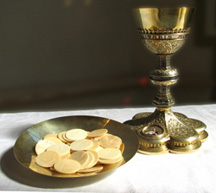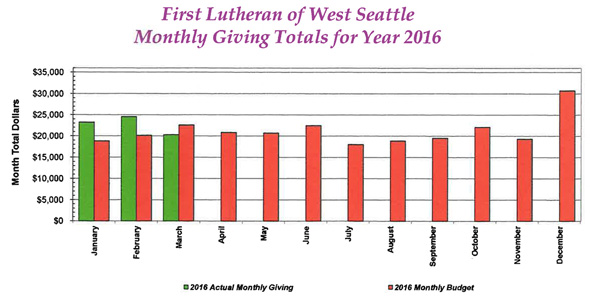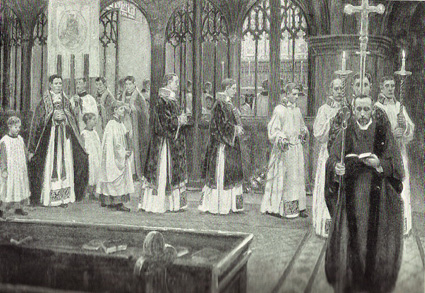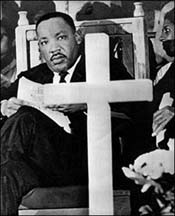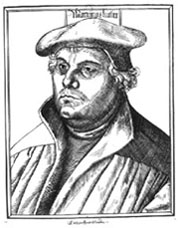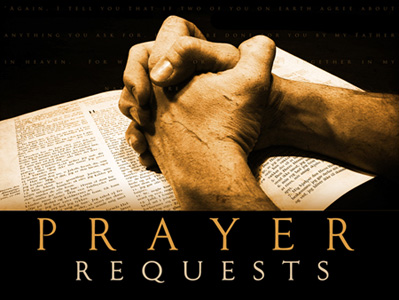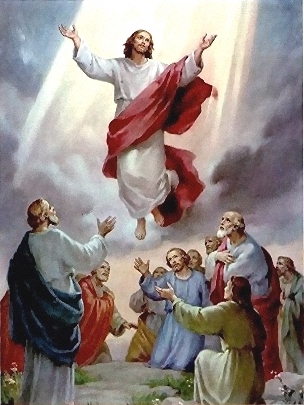May 2016
The
Holy
Spirit
&
Pleasing
God
Jesus tells us to believe in God and in himself (John 14:1), and
that the Holy Spirit will help us do both (Hebrews 9:14; Luke
11:13). On the Feast of Pentecost this year – May 15 – we will
celebrate the power of the Holy Spirit to make us new and turn
us into believers. Martin Luther preached on this very theme in
1544, two years before he died:
May the flames of the Holy Spirit enliven us anew that we might
serve the Lord with all of our heart, mind and soul (Matthew
22:37).
Pastor Marshall
|
President’s Report…
by Earl Nelson
It has been an
interesting and satisfying First Quarter this year.
This Sunday while we were singing the Offertory, I was
thinking with gratitude of the Quarterly Pledge Report.
Of the 43 members who pledged, 38 either met or exceeded
their pledges. We
often lose financial ground during the first two months of the
year, but this year we have gained ground.
To the delight of the Church Council, we have made up
some of the ground we lost last year in our monthly transfers to
savings accounts for such things as Major Maintenance.
A council member who has been observing this much longer
than I have said that this is an exceptionally positive report,
particularly for the first quarter.
Allow me to quote the text of the first two sentences of
the Offertory:
Compared to last year at this time, we are indeed gathering a
harvest. Last year
at this time, Council was beginning to exhort those who are able
to give at a higher level, and many did raise their giving and
are now sustaining it.
I was particularly mindful of this and thankful for it as
I celebrated the Eucharist in our beautiful church last Sunday.
I thank the Congregation on behalf of the Council.
May we all be properly thankful to God for His many
blessings to us in this church.
This First Quarter report probably represents a change that has
occurred in the pattern of our giving.
Though there are fewer of us than in the past, we are
giving both more and more regularly as a Congregation.
If this continues, Council may actually have an easier
time than in the past coordinating monthly expenses which are
not variable (such as payroll and utilities) with monthly giving
that has usually varied considerably in the past.
Council decided to replace the refrigerator in the Fellowship
Hall kitchen this month.
It was raining inside the old one!
Rather than throw good money after bad, we decided on a
new one from a local restaurant supply house.
It comes with a warranty and should be easier to maintain
and repair through the supplier.
|
Stewardship 2016
Month (March)
Year to date (Jan-March)
Budget
$22,627
$61,601
Received
$20,304
$68,003
Stewardship
Listen to the Word
The Word of God instructs us on how we are to give. We receive
His gift of grace and forgiveness of our sins. We receive
spiritual gifts according to the grace given us. It is up to us
to use our God-given gifts to meet the needs of others according
to our ability. When considering how we will share our gifts in
service to our church, we consider gifts of teaching, sharing
our faith with others, encouraging one another, and serving in
leadership. We are to serve humbly, generously, and cheerfully (Rom.
12:3-8).
We should be both willing and generous in our giving and should
be willing to give more than a tithe of ten percent giving if we
can. Because we are under grace, our giving is to be done as we
discern in our hearts both willingly and generously as cheerful
givers, not reluctantly or grudgingly out of obligation, duty,
or requirement. (2
Cor. 9:5-14).
As we celebrate these weeks of Easter, let us continue to
support our church through financial giving in thanksgiving for
the ultimate sacrifice Jesus made for us, when we were yet
sinners (Rom. 5:8). Let us be ever aware of the needs of one
another within our church and the greater community, and share
our gifts accordingly to bless others.
Janine Douglass, Church Council |
|
May Book
With the Mind:
Readings in Contemporary Theology
3-5 pm in the Church Lounge, Saturday, May 24th
The book for
May is Miracles: What
They Are, Why They Happen, and How They Can Change Your Life
(2014), by the best-selling author, Eric Metaxas. This book is a
defense of Biblical miracles against their naysayers. He defines
miracles as a “transgression of a law of nature by a particular
volition” of God (p. 12). He modifies this definition in two
ways. First he says that even though laws of nature might be
violated at the beginning of a miracle, once it begins it then
abide by the laws of nature (pp. 27–28, 74, 76, 79). The other
modification is that the purpose of a miracle is to disclose the
goodness of God (which is what distinguishes true miracles from
mere coincidences) (pp. 15, 17, 21, 262).
A copy of this important book on miracles is in the library. If
you would like to purchase one for yourself, contact Pastor
Marshall. Feel free to attend our meeting when we discuss how
and why God performs miracles among us.
|
“101. We have repeatedly said that to love another we must first
love ourselves. Paul’s hymn to love, however, states that love
“does not seek its own interest,” nor “seek what is its own” (1
Corinthians 13:5). This same idea is expressed in another text:
“Let each of you look not only to his own interests, but also to
the interests of others” (Philippians
2:4). The Bible makes it clear that generously
serving others is far more noble than loving ourselves. Loving
ourselves is only important as a psychological prerequisite for
being able to love others: “If a man is mean to himself, to whom
will he be generous? No one is meaner than the man who is
grudging to himself” (Sirach
14:5-6).
102. Saint Thomas Aquinas explains that “it is more proper to
charity to desire to love than to desire to be loved;”
indeed, “mothers, who are those who love the most, seek
to love more than to be loved” (ST II-2, q. 27, art. 1, 2).
Consequently, love can transcend and overflow the demands of
justice, “expecting nothing in return” (Luke
6:35), and the greatest of loves can lead to “laying
down one’s life” for another (see
John
15:13). Can such generosity, which enables us to give freely and
fully, really be possible? Yes, because it is demanded by the
Gospel: “You received without pay, give without pay” (Matthew
10:8).
103. If the first word of Paul’s hymn spoke of the need for a
patience that does not immediately react harshly to the
weaknesses and faults of others (1 Corinthians 13:4), the word
he uses next – paroxýnetai – has to do more with an
interior indignation provoked by something from without
(Corinthians 13:5)! It refers to a violent reaction within, a
hidden irritation that sets us on edge where others are
concerned, as if they were troublesome or threatening and thus
to be avoided. To nurture such interior hostility helps no one.
It only causes hurt and alienation. Indignation is only healthy
when it makes us react to a grave injustice; when it permeates
our attitude towards others it is harmful.”
[Amoris
Laetitia – The Joy of Love, An Apostolic Exhortation, April
2016.]
|
|
The
Office of verger:
A New
Program
X
X
X
A New
Opportunity
We
worship in the ancient, historical patterns of Christians that
have been handed down through the centuries.
We celebrate the Lord’s Supper at both of our Sunday
morning liturgies every week.
This is the way Christ wanted us to remember him on the
Lord’s Day.
Our
prayer together is always liturgical, following the historical
forms of the church.
We read Holy Scriptures as they are appointed in the
Lectionary. The
sermon explains those readings in terms of Law and Gospel.
In this we rely on Martin Luther’s (1483-1546)
understanding of Christ’s mission and life.
Our
hymns reinforce the scriptures read, proclaimed and prayed in
our worship. This
supports the solemnity of our praise to God the Father, Son and
Holy Spirit.
Vestments and traditional rituals also contribute to the
richness of worship.
All our corporate worship is offered within the
consecrated walls of our church which is deemed God’s holy and
sacred house of prayer. A NEW
PROGRAM: The Office of
verger At their
October meeting in 2013, the Church Council established a
worship assistants guild to be made up of men and women who
would be instructed in how to perform a series of liturgical
acts as prescribed by historical protocol and
The Manual on the Liturgy
– Lutheran Book of Worship, Philip H. Peatteicher and Carlos
R. Messerli; Augsburg Publishing House, Minneapolis, Minnesota
1979.
This group would be known by the historic title of Verger.
A
Short History The office of
verger has its roots in the monasteries of Europe during the
middle ages (12th century), sharing certain similarities with
the Minor Orders of Porter and Acolyte.
Historically, vergers were responsible for the order and
upkeep of the house of worship including the care of the church
building, the furnishings and sacred relics, preparations for
the liturgies, conduct of the laity and the burial of the dead.
This practice eventually spread beyond the walls of the
monasteries and into the churches and cathedrals throughout
Europe.
Today the Office of Verger continues to function throughout
Europe and Canada.
In America vergers are used in Episcopal Churches and
Cathedrals. In
other denominations the work of the verger has been dispersed
among a variety of service groups, i.e. acolytes, altar guilds,
ushers and maintenance staff.
Vergers at First Lutheran Church Here the
verger’s role will be ceremonial only.
Their function will be to support and augment the Acolyte
Guild whenever needed, particularly at major festivals and other
liturgical celebrations when a larger number of assistants are
needed. It is
important to state here that it is not our intent to replace the
acolytes in their duties, only to augment the acolyte guild
whenever needed.
Responsibilities To be a member of this guild will require four (4) classes of instruction. The work of the verger will include: crucifer, torchbearer, thurifer, bookbearer, lighting candles, assisting with communion distribution, receiving the offering, and ceremonial escort. These responsibilities DO NOT include that of lector or worship leader, that work will still be assigned to the deacon or subdeacon. The verger, like the acolyte, will serve under the direction of the deacon.
Vestments Vergers will
be vested in cassock and cotta.
Why
Vergers Over the years the number of acolytes available to serve has varied greatly. The current number of acolytes to draw from is small, limiting us as to what we can do for major celebrations when many are needed, for example Christmas Eve, Christmas Day, Holy Week, Easter, Pentecost, St. Mary’s and All Saints. Having a group of men and women able to perform a variety of liturgical acts will enable us to function at full capacity for all occasions.
First Lutheran Church of West Seattle has a long tradition of
worship using the historic liturgical forms of the church.
Establishing the Office of Verger enables us to continue
in that long tradition of supporting the solemnity of our praise
to God the Father, Son and Holy Spirit, by contributing to the
richness of our worship.
AN INVITATION
If you are interested and would like to participate in this
program please call the church office (935-6530) and sign up.
Instruction will begin as soon as possible.
If you have any questions please call the church office and ask
for Dean. |

|
Martin Luther King, Jr.
on Church Music
“[One]
must decide to either play gospel music or rock and roll
music. The two are totally incompatible. The profound
sacred and spiritual meaning of the great music of the
church must never be mixed with the transitory quality
of rock and roll music. The former serves to lift men’s
souls to higher levels of reality, and therefore to God;
the latter so often plunges men’s minds into degrading
and immoral depths. Therefore, I would say that you
would be giving your life to a more noble purpose if you
concentrated on the music of the church rather than rock
and roll. Never seek to mix the two…. [Note also that]
Christianity is more valid than the tribal religions
practiced [in Africa. For] at the center of Christianity
stands the Christ who is now and ever shall be the
highest revelation of God. He, more than any other
person that has ever lived in history, reveals the true
nature of God. Through his life, death, and resurrection
the power of eternity broke forth into time.” [The
Papers of Martin Luther King Jr.,
vol.
4, “Symbol of the Movement”
(January
1957–December 1958), ed. Clayborne Carson
with Susan Carson, Adrienne Clay, Virginia Shadran,
Kieran Taylor (Berkeley: University of California Press,
2000) pp. 392–93, 472.] |
Martin Luther
on True Christians
“When
we have received grace and blessedness, been baptized in
Christ, and believe, He then wants us to live
accordingly, to be obedient to God and to do what He has
commanded us in the Ten Commandments…. Not only does He
want this preached or spoken with the mouth but also
done from the heart and in actions…. [So] if you
earnestly do the will of God, gladly listen to and
believe God’s Word, and live in obedience to Him in
order to honor Him and benefit your neighbor – even if
you sometimes stumble, but get up again, and not
impenitently continue to defend your sins, oppose God’s
Word, or shamefully persecute your neighbor – then you
can boldly and cheerfully say before God: ‘Lord, Lord!’
and take comfort in the kingdom of heaven given to you
by God…. Compare those who babble and boast about their
spirituality to [this word], to see whether they agree
with the sure teaching of the Ten Commandments and faith
in Christ. When I did not find this, then I quickly
rejected them, and… boldly passed sentence on these
wicked, worthless fruit and condemned it as an evil tree
[Matthew 7:17].”
[Luther’s
Works 78:301.]
|
1 John 3.15
Monthly Home Bible Study, May 2016, Number 279
The Reverend Ronald F. Marshall
Along with our other regular study of Scripture, let us join as
a congregation in this home study. We will
study alone then talk
informally about the assigned verses together as we have
opportunity. In this way we can "gather
together around the
Word" even though physically we will not be getting together
(Acts 13.44). (This study uses the RSV translation.)
We need to support each other in this difficult project. In 1851
Kierkegaard wrote that the Bible is "an extremely dangerous
book.... [because] it is an imperious book... – it takes the
whole man and may suddenly and radically change... life on a
prodigious scale" (For
Self-Examination). And in 1967 Thomas Merton wrote that "we
all instinctively know that it is dangerous to become involved
in the Bible" (Opening
the Bible). Indeed this word "kills" us (Hosea 6.5) because
we are "a rebellious people" (Isaiah 30.9)! As Lutherans,
however, we are still to "abide in the womb of the Word" (Luther's
Works 17.93) by constantly "ruminating on the Word" (LW
30.219) so that we may "become like the Word" (LW
29.155) by thinking "in the way Scripture does" (LW
25.261). Before you study, then, pray: "Blessed Lord, who caused
all holy Scriptures to be written for our learning: Grant us so
to hear them, read, mark, learn, and inwardly digest them, that
we may embrace and ever hold fast the blessed hope of
everlasting life, which you have given us in Our Savior Jesus
Christ. Amen" (quoted in R. F. Marshall,
Making A New World: How
Lutherans Read the Bible, 2003, p. 12). And don’t give up,
for as Luther said, we “have in Scripture enough to study for
all eternity” (LW
75:422)!
Week I.
Read 1 John 3.5 noting the line
has eternal life abiding
in him. What is this like? On this read John 17.3 noting the
line this eternal life,
that they know… the only true God. How is this knowledge
eternal life? On this read John 6.68 noting the line
you have the words of
eternal life. What is it like having these words in you? On
this read 2 Thessalonians 2.16–17 noting the words
eternal,
comfort,
hope,
hearts,
establish,
work and
word. How are such
established hearts, grounded in the right works and words, a
source of comfort? On this read 1 John 5.20 noting the words
understanding,
true and
in. Why does the
truth matter so much? On this read Hebrews 3.13 noting the word
hardened. What does
this hardening do to us? On this read Ephesians 5.10–16 noting
the words unfruitful,
darkness,
wise and
most. So the truth
matters because our behavior matters. How is that so? On this
read James 1.22 noting the words
doers and
deceiving. Is that
it?
Week II.
Read again 1 John 3.5 noting again the line
has eternal life -abiding
in him. Now how does that truth from last week guide our
actions? On this read Isaiah 1.6 noting the phrase
no soundness. How bad
is this? On this read Romans 7.18 noting the line
nothing good dwells
within me. What’s the effect of this corruption? On this
read John 3.19 noting the line
men loved darkness rather
than the light. Where does that leave us? On this read John
6.44 noting the words
come and draws;
as well as 15.16 noting the play between the words
choose and
chose. What do these
two verses say about our capacity to follow Christ on our own?
On this read Romans 9.16–18 noting the words
depends,
mercy and
hardens. Is our
salvation out of hand then? On this read Philippians 2.12–13
noting all three occurrences of the word
work. Are they all
equal, or does one control the others? On this read 1
Corinthians 3.7 noting the word
only. How’s that?
Week III.
Reread 1 John 3.15 noting again the words
has eternal life abiding
in him. Is there anything else to say about the truth from
last week? On this read John 8.12 noting the words
light and
world. Why does the
world need light? On this read Philippians 2.15 noting the words
crooked and
perverse. Read also 1
John 5.19 noting the line
the whole world is in the power of the evil one. And how
does light come from Jesus alone? On this read John 10.30 noting
the line I and the Father
are one. What does Jesus pass on to us from the Father? On
this read Exodus 3.2–6 noting the words
fire and
burning; and Habakkuk
3.3–4 noting the words
brightness, light,
flashed and power. What
does this divine brightness manifest? On this read John 1.29
noting the words lamb
and sin. How does Jesus put an end to sin? On this read Hebrews 9.26
noting the words sacrifice
and himself. How does
this sacrifice help? On this read 1 John 1.8–2.2 noting the
words forgive and advocate. Is
that all the light we need? On this read 1 Corinthians 15.26
noting the line death is…
the last enemy; and Romans 6.23 noting the words
death,
sin and
wages. What could be better?
Week IV.
Read 1 John 3.5 one last time noting again the line
has eternal life abiding
in him. Is there any other word about eternal life? On this
read John 14.2–3 noting the words
house,
place and
where. What is this
place like? On this read Revelation 21.10–23 noting the words
city,
wall,
gates,
pearl,
street and
gold; Revelation 21.3
– 4 noting the words
dwell, death and
former; and
Revelation 19.6–10 noting the phrase
marriage supper. Is
this an actual place? On this read Luke 16.19–31 noting the
words carried,
to,
bosom,
between and
place. Note also the
two occurrences of the word
place in John 14.2–3.
Read as well Matthew 25.34 noting the words
prepared and
kingdom. Note also
the line in 2 Peter 3.13 about waiting
for new heavens and a new
earth, as well as the word
entrance in 1.11.
These verses all point to eternal life as a place. Do you agree?
On what grounds?
|
ANNOUNCEMENTS:
OUR
THANKS to all those
who made the Holy Week and Easter services possible.
BOOK DISCUSSION
date from April was changed from Saturday, April 23rd to
Saturday, May 7th, 3-5 pm.
Meet in the lounge.
SUMMER HYMN SCHOOL
is scheduled for Wednesday, June 29th, Thursday, June 30th and
Friday, July 1st.
Mark your calendars and watch for updates.
Compass Housing Alliance
needs bath towels.
We are still collecting them this month.
Donations can be left at the office.
PASTORAL REVIEW
for 2014-2015 is available for your study upon request.
The Executive Committee has compiled this information
over the past few weeks and filed it in the church office.
WEST SEATTLE
FOOD BANK suggested
donation for May is bar soap and toiletries.
PRAYER REQUEST:
Please contact the office during the week or Pastor
Marshall before the
liturgy if you have a prayer request.
WEST SEATTLE HELPLINE’S “Taste
of West Seattle”,
Thursday, May 26th at the Hall at Fauntleroy, 9131 California
Ave. SW, from 6-8:30 pm.
Tickets can be purchased online.
|
THE ASCENSION
OF OUR LORD
This great feast of the Easter Season, the Ascension of Our
Lord, follows Easter by 40 days.
On Thursday, May
5th,
the Holy Eucharist will be celebrated at 11:45 am in the chapel.
Study Luke 24:50:
Then
he led them out as far as
Bethany,
and, lifting up his hands,
he blessed them.
While he was
blessing
them, he withdrew from them and was carried up into heaven.
THE DAY OF PENTECOST
On
Sunday, May
15th
at the 10:30 am Holy Eucharist, we will celebrate Pentecost.
This day celebrates the "outpouring of the Spirit" and
the birth of the Church, according to the chronology and
theology of the book of Acts of the Apostles.
THE HOLY TRINITY
On Sunday,
May 22nd
we will honor the doctrine of the Holy Trinity.
On this day we will confess that our God is named
Father,
Son,
and
Holy Spirit.
This is Christ's command in Matthew 28:19 when he says to
us: "Go therefore and make disciples of all nations, baptizing
them in the name of the Father and of the Son and of the Holy
Spirit." It is this
name that our faith requires us to adore – for God is in this
name!
THE HOLY VISITATION
Holy Eucharist will be celebrated on the Feast of the Holy
Visitation, Tuesday, May 31st, in the chapel at 11:45 am.
On
this holy day we give thanks to God for the blessed words
between Saint Mary and Saint Elizabeth.
We also give thanks for the honor paid Saint Mary by the
still unborn Saint John the Baptist, when he moved in the womb
of his mother, Saint Elizabeth.
To
prepare for this festival, study Luke 1:39-47 and Isaiah 11:1-5.
|
Remember in prayer before God those whom He has made your
brothers and sisters through baptism.
June Wittman, Hannah Weyer, Mariann Petersen, Evelyn Coy,
Melanie Johnson, Chuck Prescott, Mary Goplerud, Peggy & Bill
Wright, David, Eileen and Michael Nestoss, Ion Ceaicovschi, Bob
& Barbara Schorn, Luke Bowen, Tabitha Anderson, The PLU Faculty,
Celia Balderston, Mike Harty, Asha Sagmoen, Ken Sharp, Mike
Granger, Denise Alvord, Jim Thoren, Dee Grenier, Justin
Schumacker, Kineta Langford, Ellen Marie Schroeder, Shirley
Eaton, Clark Johnson, Marie Collins, Dorothy Chase, Misty & Jill
Karakash, our presidential election year, and those infants and
families affected by the Zika virus, the great migration from
the Near East into Europe and other parts of the world.
Pray for
the shut-ins that the light of Christ may give them joy: C. J.
Christian, Florence Jenkins, Louis Koser, Anelma Meeks, Dorothy
Ryder, Lillian Schneider, Crystal Tudor, Nora Vanhala, Elmer &
June Wittman, Peggy & Bill Wright.
Pray for our bishops Elizabeth Eaton and Brian Kirby Unti, our
pastor Ronald Marshall, our deacon Dean Hard and our cantor
Andrew King, that they may be strengthened in faith, love and
the holy office to which they have been called.
Pray that God would give us hearts which find joy in service and
in celebration of Stewardship.
Pray that God would work within you to become a good
steward of your time, your talents and finances.
Pray to strengthen the Stewardship of our congregation in
these same ways.
Pray for the hungry, ignored, abused, and homeless this May.
Pray for the mercy of God for these people, and for all
in Christ's church to see and help those who are in distress.
Pray for our sister congregation:
El Camino de Emmaus in the Skagit Valley that God may
bless and strengthen their ministry. Also, pray for our parish
and it's ministry.
Pray that God will bless you through the lives of the saints:
St. Philip and St. James, Apostles; Monica, mother of Augustine,
387; and John Eliot, missionary to the American Indians, 1690. |
|
A Treasury of Prayers
O Lord God,
may your Spirit abide in me to keep me from falling into
unbelief and unrighteousness; to teach me to live according to
your will; to help me do the work you have given me to do; to
comfort me in my trials; to give me the power to endure; and
finally to bring me to everlasting life. In Jesus’ name I pray.
Amen.
[For All the Saints
(ALPB, 1994-1996) IV:20,
altered] |

